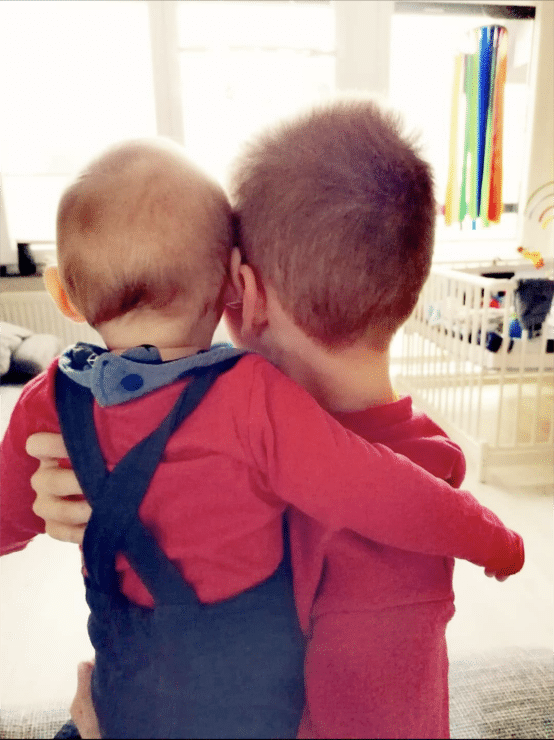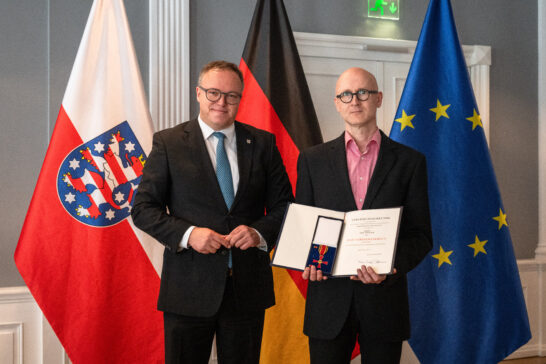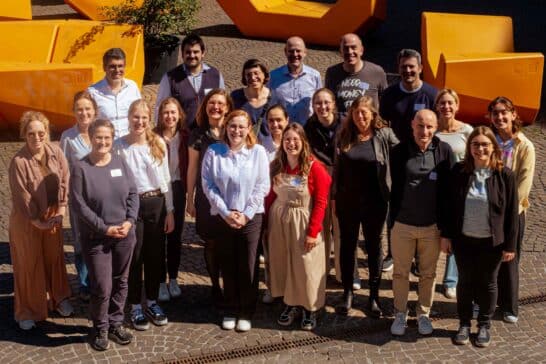“All I See is a Normal Child”
“He won’t be able to play football with you, but he will cheer you on!”
These are the words with which the parents of Tim, now 3 years old, explained the condition of the newborn family member to his two older brothers.
Their reaction not only surprised the parents, but most importantly gave them courage for the future.
“I don’t see a disability; all I see is a normal child.” Words spoken by an 8-year-old at the time. This childlike perspective on things that is based on the obvious and not the many eventualities of the future is priceless. And this perspective is what helped the family of now five, from near Wolfsburg, Germany, get out of the difficult early stages and towards a fulfilled and happy family life.
Because those early days were tough
Mother Alina remembers the birth of her youngest child in the midst of the coronavirus pandemic: Little Tim had swallowed amniotic fluid and his muscle tone was increased, so he was admitted directly to the intensive care unit. Drinking was difficult and took a lot of patience. Still, he was discharged from hospital without a diagnosis. Tim’s parents noticed that Tim was developing differently to his older siblings but their concerns and suspicions were initially dismissed and not taken seriously. Thanks to their persistence and also thanks to an attentive chiropractor, an MRI was carried out at the age of 4 months and the diagnosis was made.
In retrospect, Tim’s mom considers this time to be the most formative period of her life. Because of the COVID-19 restrictions in place at the time, even Tim’s father was not allowed to come to the hospital. Being alone with a newborn who, after sleeping a lot at first, cried more and more often was overwhelming. Fears and worries about the little boy, a lack of understanding from other patients and medical staff, as well as a poorly communicated diagnosis did the rest.
Losing the Ground
The feeling that remained was that somebody had pulled the ground out from under their feet.
Without any ground to stand on, the next steps had to be small and cautious. But where do you find the courage and strength to take those steps?
First Steps
Following the diagnosis, Alina and her husband came into contact with other affected families via the PCH forum. This connection was a huge source of support for them and also had a direct impact on Tim thanks to the exchange of information, e.g. about medication and aids.
“All I see is a normal child” – with this sentence, Tim was welcomed into the family by his brothers, and this sentence helped the family to find and follow their path.
The initial reaction of “our life as it was is over now” turned into “if not now, when else?”.
Tim now travels around the world with his family; he has been to the top of the Eiffel Tower in Paris, and it was him and the other men in the family who had to encourage his mother to come along. The family also toured the Baltic Sea in a camper van, stayed on a gently rocking houseboat that Tim loved, and flew to Sardinia together. These trips are a great joy for the family, bringing them closer together, creating memories and making them proud of each other.
Burden and Relief
Alina says that carrying Tim is becoming an increasing burden; it’s difficult to take him along on a quick shopping trip or to the football field to cheer on the family members on the field. Help comes from his grandmother and volunteers from the children’s hospice. In addition, Tim now goes to a special needs kindergarten.
Alina tries to suppress her fears about the future. “We don’t know what tomorrow holds, we only know the here and now” – and they try to make the best of it.
Pure Family Life
These thoughts give Alina strength for her family life – a life between two jobs, three children, between trips, short breaks (as a couple or with the two older boys), between cheering on their favorite team in the stadium, meeting up with friends, and going to sleepovers.
Tim likes to be in the thick of things and finds being alone less exciting, as he is used to lots of commotion from an early age; older siblings are clearly the best occupational therapists, speech therapists and the like.
The fact that their life has changed little in retrospect also seems to be a result of the openness with which the parents have approached friends and acquaintances about the diagnosis.
“I sent an email to everyone explaining the situation and openly asking for understanding and consideration in the beginning. But I also made it clear that we didn’t want to be treated with kid gloves; we wanted to continue to be ‘completely normal’ and that’s how things turned out.”
“You Can Find Happiness in Any Situation”
Nevertheless, the family has changed. “Tim is the weakest link in the chain but he has made us the toughest people. He has given us a lot of courage,” says Tim’s mother. “You can complain in every situation but you can also find happiness in any situation.“
Alina is touched and proud to see how well the older siblings interact with Tim and how they change as a result of her youngest son’s condition; how they grow up to be social and understanding people who look at things in a differentiated and open way.
“I don’t see a disability; all I see is a normal child.” These were the words of the oldest of the three brothers. That’s how it was and that’s how it is. Tim has PCH2, Tim will never play soccer, but Tim is in the middle of it all. He is involved and is part of a family that loves and supports him.
“Thank you Tim for opening our eyes to what is important in life.”
Share Your Own Story
to support and encourage other families on their journey.


